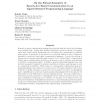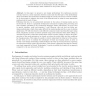610 search results - page 56 / 122 » Synchronous Programming of Reactive Systems |
137
Voted
JAIR
2007
15 years 2 months ago
2007
Research on agent communication languages has typically taken the speech acts paradigm as its starting point. Despite their manifest attractions, speech-act models of communicatio...
142
click to vote
EMSOFT
2011
Springer
14 years 1 months ago
2011
Springer
System specifications are often structured as collections of scenarios and use-cases that describe desired and forbidden sequences of events. A recently proposed behavioral progr...
120
click to vote
IWPC
2007
IEEE
15 years 8 months ago
2007
IEEE
Programs that use multi-threaded concurrency are known to be difficult to design. Moreover, research in computer-science education suggests that concurrency and synchronization co...
121
click to vote
HYBRID
2005
Springer
15 years 7 months ago
2005
Springer
In this paper, we present a new design methodology for synchronous reactive systems, based on a clear separation between control and data flow parts. This methodology allows to fa...
137
click to vote
SIGOPSE
1998
ACM
15 years 6 months ago
1998
ACM
with this, the thread abstraction was introduced. While threads are handling events, or awaiting specific events, unrelated events can be handled by other threads. Unfortunately, ...


